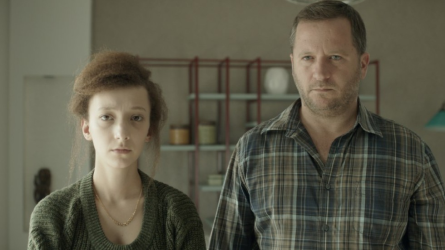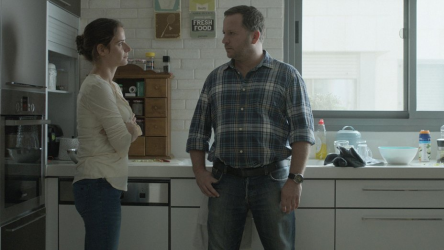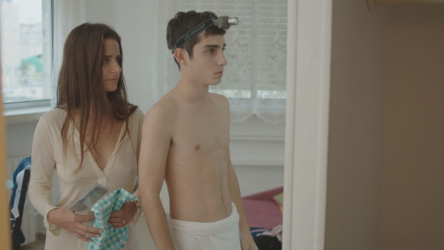Film festivals are, necessarily, crap shoots. Often, they’re crap shoots with really bad odds. No matter what sort of film you like (or even love), if you’re picking out of the film fest hat, you’ve got a really good shot of seeing something that makes you rethink your tastes. We’ve had such good luck with the Israeli Film Fest that The Boy is a little spoiled. Two years ago was so good, he’s more or less forgotten last year’s disappointments. This year, however, schedules were such that we were lucky to make the three films we did: the shorts (The Mute’s House, Anna, An Average Story), A.K.A. Nadia and this one, Beyond the Mountains and Hills.

Well, this looks like fun.
This movie is, basically, a mid-life crisis movie. I forget when the midlife crisis was invented, but I think it was in the ’70s, with the mainstreaming of the concept beginning in 1980’s Middle Age Crazy (Bruce Dern, Ann Margret). This would make sense as the Boomers were hitting their 30s (35 used to be “middle aged”, I remind the young folks today who are still “finding themselves” in their 30s) and the previous two decades of sex, drugs and rock ‘n’ roll had to have given way to something more like a mundane lifestyle.
But the thing is, this is an Israeli mid-life crisis movie and the constant presence of an existential threat tends to focus the mind in ways that is largely unknown, for example, to average Americans and Europeans. In this film by Eran Kolirin (who directed The Band’s Visit, one of the earliest reviewed films here at the ‘gique), our hero is David, a guy who’s just retired from the military—protecting the home front—for the past 22 years and is now at loose ends, trying to find a purpose in life. The movie gives us a bit of a taste of that, as he ends up in a multilevel marketing scheme which, hey, might be good for some, but is really, really not good for our hero. (He sells one package by extorting a sleazy co-worker who is using him as cover for his affairs into a buying it.)

What? In the MLM world that’s called “business as usual.”
Meanwhile his wife, Rina, is succumbing to the attentions of one of her literature students, his daughter is a radical activist and his son—well, his son seems to be pretty okay at first but he finds out about his mother and is tormented regarding whether or not to tell his dad, and this ends up bringing on the unexpected climax of the film. The daughter, Yifat, actually ends up being the focus of the picture and, if you like, a metaphor for Israelis generally.
Yifat has a radical activist boyfriend, who’s too cool to take a ride to the demonstration with David because it’d be like visiting concentration camps with Hitler. (No joke, that’s the analogy used.) But Yifat quickly discovers that Israeli leftist boyfriend has pretty clear limits of commitments, and she finds herself attracted to a Palestinian. The Palestinian is sketchy as hell, but when she demurs on his invitation to come to a little party with his pals in the hills, she feels guilty and probably racist. Later, she finds out he’s dead, and goes into Palestine to attend the funeral where she is abused by the dead guy’s wife.
Realizing she’s in trouble, she begs a ride from dead guy’s friend, and finds herself once again open to his sketchy advances.
And this is basically your movie: Our characters commit a variety of sins, and they also commit a variety of actions which might or might not have tremendous import, and the characters never know. But they are burdened.

Sometimes, the burden is the sudden realization of what a moron you’ve been.
